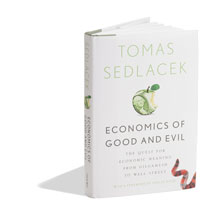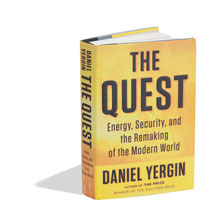Book Reviews
Finance & Development, September 2011, Vol. 48, No. 3
Justice in Economics

Tomas Sedlacek
Economics of Good and Evil
The Quest for Economic Meaning from Gilgamesh to Wall Street
Oxford University Press, Oxford, New York, 2011, 368 pp., $27.95 (cloth).
Some have put the financial crisis behind them. Calls to insert ethics into banking or to rethink the fundamentals of economics have been pushed aside by the practical men and women of business or economics eager to get on with life. Financial institutions have gone back to the old normal; vested interests are resurgent in the debate on regulatory reform, while in a striking example of confirmation bias, many economists have found that the crisis only confirmed what they already believed.
And yet . . . . The crisis has devastated employment and household balance sheets, and has left a legacy of fiscal tensions that will weigh on governments for a generation. Deleveraging is proving painful, and problems of the euro area and deteriorating growth prospects worldwide indicate that further troubles may lie ahead. And in various places, economists are thinking about whether the financial sector has fundamentally distorted our societies and whether economics as a discipline needs to take a different tack.
This erudite, original, and timely book is an exercise in metaeconomics, a look at the beliefs lying behind economics. Tomas Sedlacek, a leading Czech economist, considers the intellectual origins of some of the discipline’s assumptions and some alternative approaches that have been neglected in our precrisis consensus. All rational knowledge rests on some assumptions about what is important and how the world works. These are narratives or myths that we accept, often unconsciously, as giving the world meaning. In economics, such myths include the invisible hand, the perfect market, and rational, utility-maximizing homo economicus.
Sedlacek draws on wide and eclectic reading to stress that economics is a cultural product. In the first four chapters, he trawls Sumerian, Old Testament, classical Greek, and Christian sources for their insights into economic issues. The next three short chapters examine the contributions to our economic thinking of René Descartes, Bernard Mandeville, and Adam Smith. The final section, “Blasphemous Thoughts,” consists of short essays applying the findings of the earlier chapters to such matters as whether greed is good, the concept of growth, whether utility or good should be maximized, the invisible hand, homo economicus, animal spirits, the proper role of mathematics in economics, and the nature of truth in economics and other sciences.
For the classical economists, economics was part of moral philosophy. But since then, morality has been elbowed out as Mandeville’s “greed is good” approach displaced older views of both Jewish and Christian traditions, as well as those of Smith and David Hume. Similarly, the legacy of utilitarianism is an approach of individual utility maximization, rather than John Stuart Mill’s moral stress on collective utility—the greatest good of the greatest number. Virtually the only foothold that ethics has in modern economics is as the basis for well-functioning institutions in a prospering economy. Sedlacek suggests that the time is ripe for reexamining whether the products of the economy are indeed “Goods” in the moral sense.
He stresses Smith’s explicit disagreement with Mandeville on whether private vice was needed to fuel the public good, thus acquitting Smith of the charge that he believed the pursuit of individual self-interest is a guarantee of a nation’s prosperity. In both The Theory of Moral Sentiments and The Wealth of Nations, Smith, in line with his close friend, Hume, professed that human society was held together by principles of benevolence and self-restraint, and the invisible hand that brought supply and demand together through the action of self-interest was just an ancillary mechanism. Indeed, the concept of the invisible hand owes more to Social Darwinism than to Smith.
The search for a single principle underlying economic behavior has led to a discipline that takes self-interest as the driver of all economic phenomena, despite Smith’s explicit warning against trying to explain human actions with too limited a set of motivations. Man is reduced to homo economicus, an agent driven solely by rational choice. But neither Hume nor Smith allowed that human behavior could be explained by a single egotistical principle. They held that “feelings, not rationality, are the moving force behind human behavior.”
Intellectual movements need time to gestate. A new intellectual edifice has to have a roof before people will abandon the old one en masse. It requires a critical mass of new formulations that give practical insight into current problems. But as Keynes put it, “soon or late, it is ideas, not vested interests, which are dangerous for good or evil.” Sedlacek’s interesting book is part of the construction project for a better economics and a more just world.
Mark Allen
IMF Senior Resident
Representative for Central
and Eastern Europe
Quest in Search of Itself

Daniel Yergin
The Quest
Energy, Security, and the Remaking of the Modern World
The Penguin Press, New York, 2011,
816 pp., $37.95 (hardcover).
Daniel Yergin’s stimulating new book, The Quest, offers an informative guide to how energy shapes and is shaped by global economics, power, and security. Yergin has taken on a large and complex subject. But he makes his lengthy book accessible to a broad audience by developing his analysis through hundreds of short vignettes, many of which are rich in historical details. General readers will learn a great deal about the wide world of energy on which we depend so completely—how it came to be the way it is and how it works. Energy experts, while not the primary audience, will gain a greater appreciation for the complex interplay of technology, markets, environments, and politics in today’s energy debate.
Yergin begins his story on December 31, 1991, the day the former Soviet Union ceased to exist. Readers may wonder (as I did) why a story about energy begins in Russia, out of the spotlight of the infamous Middle East. The reason is that this energy superpower is struggling with the many blessings and curses of an oil and gas economy. Russia has the potential to redraw the world map of fossil fuels, but it still has to get its own house in order. It must become much more efficient, orderly, and organized. And Russia must dial down domestic dependence on natural resources to capitalize on its vast natural resource wealth.
The troublesome geopolitical costs of oil and gas also come into sharp focus in Russia. Access to Asia’s lucrative markets is stymied by perpetual unrest in neighboring states. Converting Russia’s resources into economic growth requires finding a secure way out of central Asia to points south. Yergin details the personalities, politics, policy vacuum, chaos, and violence that hamper economic security from resource wealth. It’s one thing to have mineral wealth and another to engage strategically to convert it into long-term national growth and regional stability.
With political unrest as a backdrop, Yergin tells how globalization has begun to knit the world together economically and socially in ways previously unimagined. Distance has disappeared along with borders as finance and supply chains tie production and commerce together around the globe. Maintaining the energy equilibrium is elusive. Yergin points out how oil and gas (as both physical commodities and financial instruments) have the capacity to transform national economies, and nations themselves.
The delicate balance in energy markets is easily disrupted by any number of forces. Resource nationalism, ethnic conflicts and populist revolts in oil-exporting nations, unanticipated swings in the world economy, disruptive innovations in technology and finance, red-hot growth in emerging nations, political upheaval at home and abroad, wars and skirmishes, terrorism and cyber-attacks that target energy systems, climate change, and mother nature all profoundly influence our energy future. Yergin asserts that “the next crisis could come from almost any direction.”
While Yergin posts many valuable warning signs, he gives us too few tools to gauge where the priorities lie in energy, security, and remaking of the modern world. Readers will yearn to know how Americans and global citizens might craft a rational energy strategy for the 21st century. What The Quest offers is thousands of intricate puzzle pieces, all quite fascinating to ponder, but challenging to assemble.
What this book lacks in resolutions, it makes up for in valuable correctives. Yergin argues that U.S. aspirations of energy independence are not only unrealistic, but can corrode international relations that are critical to energy security in a resource-constrained, interdependent world. Infinitely versatile electricity “underpins modern civilization.” For the business world, the biggest energy security issue will be the increasing importance of electricity, with the majority of innovations driven by electric power. While the world is not running out of oil—unconventional oils could provide ample supplies well into the future—we must increase the prevalence of electric cars for a multitude of security reasons. Rather than jeopardize global mobility, electric vehicles would provide energy stability and free up oil for other needs. Beyond these nuggets, there is much more intelligence to mine in this book.
In the end, Yergin reminds us that energy is all about trade-offs. Charting our energy future requires that we navigate the inherent risks and challenges that oil, gas, nuclear, and other energy sources portend. There is no certainty in securing our energy future. Rather, energy security will be an ongoing quest, in search of itself.
Deborah Gordon
Co-author of Two Billion Cars: Driving Toward Sustainability and a Senior Associate at the Carnegie Endowment for International Peace


